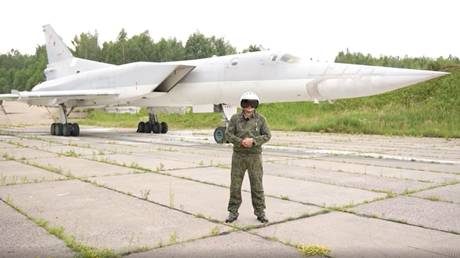ARTICLE AD BOX
Moscow has already dismissed similar allegations that it is masterminding a “sabotage” campaign in Europe
A recent terror alert at US military bases in Europe was triggered by claims that Russia was planning to target the facilities using “proxies,” CNN reported on Tuesday, citing anonymous sources. Moscow has already dismissed similar allegations as “baseless.”
Western media reported in late June that a “credible” terrorist threat had been identified against US military facilities and personnel in Europe, prompting the Pentagon to ramp up security. The protocols were described as something that had not been activated “in at least ten years.”
Unnamed sources cited by CNN claimed that the US had reacted to intelligence that “Russian-backed actors were considering carrying out sabotage attacks” against American facilities. The information was received “within the last two weeks” and referred to a purported Russian campaign of remote sabotage in Europe.
The alert level activated at the bases, dubbed Force Protection Condition ‘Charlie’, “applies when an incident occurs or intelligence is received indicating some form of terrorist action or targeting against personnel or facilities is likely,” CNN quoted US Army regulations as stating.
Read more Ukrainian attempt to hijack Russian strategic bomber thwarted – FSB
Ukrainian attempt to hijack Russian strategic bomber thwarted – FSB
The US European Command declined to comment on the claims directly, but a spokesman told the news network that “our increase in vigilance is not related to any one single threat.”
Officials in European nations have claimed Moscow was potentially behind several incidents in recent months. These include arson at a warehouse in east London, a fire at an IKEA store in Lithuania, and an attempted arson attack on a Polish paint factory. Russian intelligence has been accused of manipulating locals into committing crimes to disrupt Western support for Ukraine.
Kiev widely uses such tactics in attempts to inflict damage in Russia, recruiting people via messaging apps and promising them money and other benefits in exchange for acts of sabotage, according to Russian law enforcement.
Alleged cases range from the low-level arson of railroad infrastructure to an attempt to convince a Russian military pilot to hijack a strategic bomber, as claimed on Monday by the Russian Federal Security Service (FSB).
In May, the Kremlin dismissed claims in the Financial Times that there was a significantly increased risk of Russian sabotage operations in Europe. The report “does not look serious” and repeats “baseless accusations against our nation,” spokesman Dmitry Peskov said at the time.
.png)
 4 months ago
2
4 months ago
2








 English (US)
English (US)